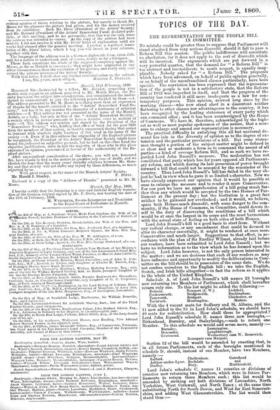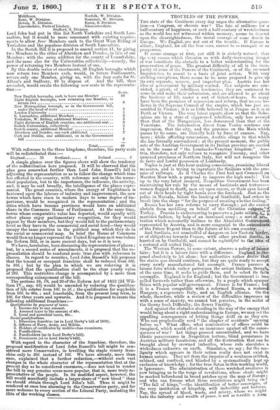TOPICS OF THE DAY.
THE REPRESENTATION OF THE PEOPLE BILL IN COMMITTEE.
No mistake could be greater than to suppose that Parliament will stand absolved from very serious discredit should it fail to pass a Reform Bill this session. The public indifference will constitute no absolution, for it does not apply to the sort of discredit which will be incurred. The arguments which are put forward in a very powerful quarter, that the demand for " a Reform Bill" is too abstract and inconsiderate to merit respect, is equally inap- plicable. Nobody asked for " a Reform Bill." The proposals which have been advanced, on behalf of public opinion generally, or on behalf of the unenfranchised classes particularly, have been specific. The conviction has been expressed that the representa- tion of the people is not in a satisfactory state, that the Reform Bill of 1832 was imperfect in itself, and that the progress of the country has rendered it still more inadequate as a law for con- temporary purposes. This opinion, avowed long since by the working classes—who now stand aloof in a discontent neither flattering to other classes nor advantageous to the country, it has been recognized by the leading statesmen of every party which can command office ; and it has been countersigned by the House of Commons. We have it, therefore, acknowledged by the high- est as well as most popular spokesmen of the nation, that a mea- sure to enlarge and amend our representation is necessary.
The practical difficulty in satisfying this all but universal de- mand has lain in the diversity of opinion as to the degree of ex- tension and the particular provisions of a bill. But some states- men thought a portion of the subject matter might be defined in so clear and so moderate a form as to command the assent of all parties—a kind of average Reform Bill, and as such we have re- garded Lord John Russell's measure. The moderation has not conciliated that party which has for years opposed all Parliament- ary reform, and which daring its last possession of power brought forward a bill that could not be accepted by the remainder of the country. Thus Lord John Russell's bill has failed in the very ob- ject he had in view when he gave it so limited a character. Now we have already expressed our opinion that it would be possible at once to enlarge the measure and to render it more Conservative. For our part we have no apprehension of a bill going much fur- ther than any which would be accepted by the two Houses of Par- liament at the present day; but the hesitation is a great fact neither to be gainsaid nor overlooked; and it would, we believe, spare both Houses much discredit, with some danger to the com- munity, if the House of Commons, in Committee, could devote it- self to the duty of discovering the conditions of a bill which would be at once the largest in its scope and the most harmonious with the actual state of feeling on both sides of both Houses.
Lord John Russell's bill is a good basis to start from. Without any radical change, or any amendment that could be deemed to alter its character essentially, it might be rendered at once more Conservative and much larger. Suggestions to that effect, in ac- cordance with the plan of Er Eardley Wilmot, already laid before our readers, have been submitted to Lord John Russell ; but we have no information as to the view which he has formed upon the subject. Lord John however, is not the only person interested in the matter ; and we are desirous that such of our readers as may have influence and opportunity to modify the deliberations in Com- mittee on the bill should be in possession of the same data. We do not confine ourselves to the English bill ; we take the English, Scotch, and Irish bills altogether—in fact the reform as it applies to the whole of the United Kingdom.
Schedule A. of Lord John Russell's bill names 25 boroughs now returning two Members of Parliament, which shall hereafter return only one. To this list might be added the following :— Bodmin. Newport (I. W.) Lichfield.
Cockermouth. Bridgenorth. Buckingham.
Tamworth. Bridport. Chichester, or Tavistock. Huntingdon. Matson.
With the 4 vacant seats for Sudbury and St. Albans, and the 11 now added to the 25 in Lord John's schedule, we should have 40 seats for redistribution. How shall these be appropriated ? Lord John Russell's schedule B. names three new boroughs,— Birkenhead, Burnley, and Staleybridge,—each to return one Member. To this schedule we would add seven more, namely :- Barnsley. Leamington. Doncaster. Loughborough. Gravesend. Wednesbury cum W. Bromwich. Ramsgate cum Margate.
Section 12 of the bill would be amended by enacting that, in in all future Parliaments, each of the boroughs mentioned in schedule D. should, instead of one Member, have two Members, namely :— Salford. Cheltenham. Gateshead Ashton-under-Lyne. Rochdale. and Dudley. Bury. Huddersfield.
Lord John's schedule C. names 11 counties or divisions of counties now returning two Members, which were in future Par- liaments to return three Members each ; this list would be amended by striking out both divisions of Lancashire, North Yorkshire West Cornwall, and North Essex ; at the same time substituting North for South Devon, and West for East Somerset- shire, and adding West Gloueestershire. The list would then stand thus :—
Middlesex. Norfolk, W. Division.
Kent, W. Division. Somerset, W. Division. Devon N. Division. Essex, S. Division. Lincoenshire, Parts of Lindsey. Gloucestershire. Stafford, S. Division.
Lord John had put in this list North Yorkshire and South Lan- cashire, but it would be more consonant with existing require- ments to allow four Members each to the Great West Riding of Yorkshire and the populous division of South Lancashire. In the Scotch Bill it is proposed to amend section 11, by giving two Members to the cities of Aberdeen and Dundee, in lieu of one Member ; with the same addition for the county of Lanarkshire, and the same also for the Universities collectively—namely, the power of returning two Members instead of one. By this double series of enactments, 36 English boroughs which now return two Members each, would, in future Parliaments, return only one Member, giving us, with the four seats for St. Alban's and Sudbury, 40 to dispose of. And the bill, thus amended, would create the following new seats in the representa-
tion.:—
Seats.
New English boroughs, each to have one Member 10 Eight English boroughs, now returning one Member, to return two New Metropolitan borough, as in the Government bill, under the head of seats 2 London University 1 S. Lancashire, additional Members 2 Yorkshire, W. Riding, additional Members 2 Eight divisions of English counties, one additional seat 8 Scotch Universities, collectively 2 Scotch county, additional Member 1 Aberdeen and Dundee, one each additional 2 Cork and Dublin, one additional, as in the Government bill 2 Total 40
With reference to the three kingdoms, therefore, the party seats
will be redistributed thus:— England. ... 33 Scotland S Ireland 2
A simple glance over the figures above will show the tendency of the redistribution here proposed. It will be observed that the plan goes somewhat further than Lord John Russell's bill in adjusting the representation so as to follow the change which time has effected in the country, with reference not only to the nume- rical population, but to the importance, the influence, the activity, and, it may be said broadly, the intelligence of the places repre- sented. The great counties, where the energy of Englishmen is bestowed upon the labours of industry and improvement, the new towns which have risen in modern clays to some degree of im- portance, would be recognized in the representation ; and the cities which have become provinces would have an additional share in the Commons House of Parliament. At the same time, towns whose comparative value has departed, would equally with other places enjoy parliamentary recognition, for they would appear by their members but they would fall to the parliamentary level as they have in the commercial and social level—they would occupy the same position in the political map which they do in the social or commercial map. In brief the House of Commons would then no longer represent the United Kingdom as it was before the Reform Bill, or in more ancient days, but as it is now. We have, heretofore, been discussing the representation of places; but, by a second series of amendments, it is proposed that the re- presentation should be rendered more true also with reference to classes. In regard to counties, Lord John Russell's bill proposes that the tenant or occupant franchise shall be reduced from 501. to 101.; but by the plan to which we are referring it is proposed that the qualification shall be the clear yearly value of 201. This restrictive change is accompanied by a more than corresponding enlargement of the bill. The sections 18, 19, and 20 of the Reform Act of 1832 (2d Wil- liam IV., cap. 45) would be amended by reducing the qualifica- tion of life estates from 10/. to Si.; the qualification for eopyholds from 10/. to 40s.; and leaseholds, from the present long term, to 10/. for three years and upwards. And it is proposed to create the
following additional franchises:— Qualification by payment of taxes.
1. Income-tax to any amount. 2. Assessed taxes to the amount of 40s.
3. Local and parochial taxes, 40s.. Social qualification&
1. Education franchise (as in Lord Derby's bill of 1859).
2. Officers of Navy, Army, and Militia. 3. Holders of certaficates by middle-class examiners. 4. Fimdholders.
5. Fundholders (as in Lord Derby's bill).
6. Pensioners (as in Lord Derby's bill).
With regard to the character of the franchise, therefore, the proposed modification of Lord John Russell's bill might be con- sidered more Conservative, in levelling the staple county fran- chise only to 20/. instead of 10/. We have already, more than once, explained that a further reduction,—without such vast changes in the whole character of the representation that at the present day as be considered enormous,—does not tend to render the bill in any genuine sense more popular, that is, more truly re- presentative of the people. In its modified aspect, however, the bill would manifestly inchide a larger share of "new blood" than we should obtain through Lord John's bill. Thus it might be rendered at once less alarming to the Conservative party, and far more welcome to every section of the Liberal Party, including the elite of the working classes.



























 Previous page
Previous page